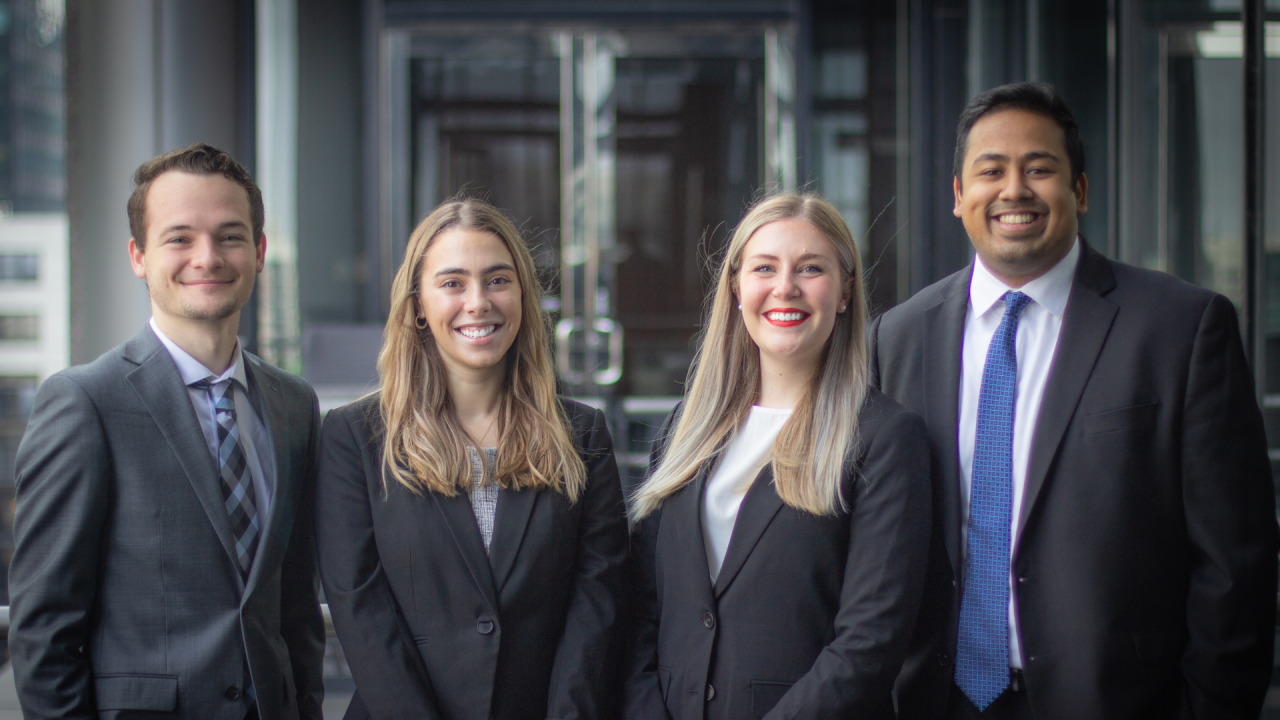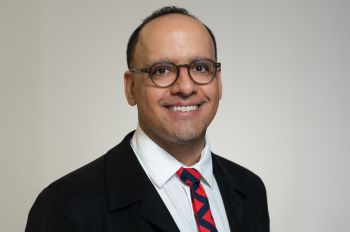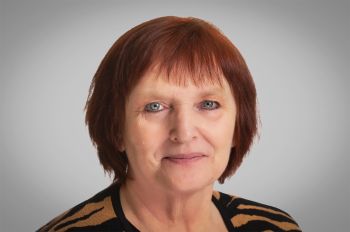Chicago-Kent Reaches Finals in National Civil Trial Competition

A team of Chicago-Kent College of Law students reached the finals of the most renowned civil trial competition in the country this month.
Zoe Appler ’22, Annora Alfonso ’23, Razaul Haque ’23, and Cole Gunter ’23 were finalists in the 2021 National Civil Trial Competition, which took place over Zoom in mid-November. Sixteen teams competed this year; Appler also won best closing argument for the entire tournament.
“The NCTC is one of the most prestigious invitational trial competitions in the country. This year the Kent team had an exceptional run to the finals, losing [the finals] by one ballot,” says Judge David Erickson, director of Chicago-Kent’s trial advocacy program. “Led by Top Gun champion Zoe Appler, they showed incredible potential to make their mark in the National Trial Competition this spring.”
The performance was all the more impressive due to the fact that the team was compiled in a last-minute scramble. Schools had six weeks to prepare for the competition, but two Chicago-Kent students had to drop out after preparations had begun. They were replaced by Appler and Haque, with Haque joining the team just two weeks before the competition took place.
Still, teammates credited Lorianna Anderson, one of the students who had to step down due to a family emergency, with doing flawless preparatory work, allowing the team to stay on track.
“She was integral to us succeeding,” Haque says.
The competition revolved around a fictional case that was loosely based on a famous wrongful death civil suit. In 2013 a young woman, Elisa Lam, drowned at a downtown Los Angeles hotel, against which the woman’s family filed suit.
The facts were largely the same as those in the Lam case: the body of a young woman was found floating in a water tank on the roof of a hotel; a medical examiner later determined that the woman had drowned.
The roof was ostensibly off limits for the hotel’s guests, but it was accessible by multiple fire escapes that weren’t locked, monitored, or secured by alarms. An access door from the stairwell was also unlocked, and its alarm did not work. There were no cameras or alarms on the roof.
Those facts were highlighted by Appler and Haque, representing the plaintiff, the drowned woman’s family, who had brought a wrongful death suit against the hotel.
Appler says the theme of their case was “carelessness creates consequences. The hotel very easily could have taken safety precautions to prevent people getting to the roof. They knew ways to fix [access issues] and didn’t fix them.”
Gunter and Alfonso, arguing for the defense, pointed out that the hotel had clear signage that patrons weren’t supposed to go on the roof. They argued that there was no “reasonable foreseeability” that would lead the hotel’s owners or management to believe a guest would sneak up there, much less be liable for it.
The defense team could have argued that the woman had a bipolar disorder that contributed to her death, or even broached the possibility that she was the victim of foul play, but believed the “reasonable foreseeability” defense was the simplest, strongest argument.
“This hotel had been around 100 years, and had never seen guests up there,” Gunter says, noting that the original civil suit brought by Lam’s family was dismissed under the “foreseeability” defense.
Appler notes that when arguing for the plaintiff, “We had judges that said they liked the fact that we pointed out it only took one person dying like this to be a problem. It countered the foreseeability defense,” Appler says.
The team competed in four preliminary rounds against the University of Akron School of Law (a 3–0 win, arguing as plaintiff), University of California, Berkeley School of Law (a 2–1 win, arguing as the defense), University at Buffalo School of Law (a 3–0 win, arguing as plaintiff), and University of California, Los Angeles School of Law (a 2–1 loss, arguing as the defense).
They competed in the semifinals against the Stetson University College of Law (a 3–0 win, arguing as plaintiff) and in the final against the UCLA team (a 3–2 loss, again arguing as plaintiff).
Three of the four members of the UCLA’s team were reigning champions from last year’s National Trial Competition.
Appler grew up in Buffalo, New York, and received a bachelor’s degree in political science from American University. In June 2021 she won the Top Gun National Mock Trial Competition. She has accepted a position upon graduation with Swanson Martin & Bell in Chicago, where she will field cases relating to medical malpractice.
Alfonso grew up in Wausau, Wisconsin, and received her bachelor’s degree in philosophy and political science from Marquette University. She has worked as a law clerk with Golan Christie Taglia in Chicago.
Born and raised in Wichita, Kansas, Gunter received a bachelor’s degree in political science from University of Illinois Chicago. He has worked as a law clerk at Acuna Law Offices in Chicago and the Cook County Public Defender’s Office, and is currently working at SmithAmundsen LLC.
Haque grew up in Schaumburg, Illinois, and received his bachelor’s degree in political science from the University of Illinois Chicago. He has clerked with both the Acuna Law Offices and SmithAmundsen LLC.



